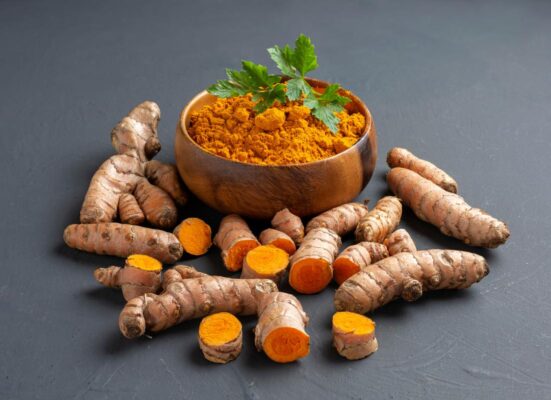Health Benefits of Tumeric
Turmeric is a yellow spice that is widely used in cooking and has been used for centuries in traditional medicine. The health benefits of turmeric cannot be overemphasized. It contains an active compound called curcumin, which has been studied for its potential health benefits. Curcumin has anti-inflammatory and antioxidant properties, and research suggests it may be beneficial for a variety of health conditions.
Curcumin (turmeric) and its health benefits
Curcumin is a bioactive compound, meaning it can interact with molecules in the body to affect biological processes.
Anti inflammatory effects
One of the main ways curcumin works is by reducing the activity of inflammatory enzymes. Curcumin’s anti-inflammatory effect is thought to be due to a few different mechanisms: One is its ability to inhibit the activity of inflammatory enzymes, such as cyclooxygenase (COX) and lipoxygenase (LOX). These enzymes are responsible for producing prostaglandins, which are molecules that promote inflammation.
The curcumin in turmeric also inhibits the activity of nuclear factor kappa B (NF-kB), a protein that plays a role in regulating the body’s immune response. Finally, it may also reduce the production of cytokines, which are proteins that promote inflammation.

It has anticancer effects
Curcumin may also inhibit the growth of cancer cells.
Turmeric is thought to have anticancer effects through several different mechanisms: One is its ability to induce apoptosis, or programmed cell death, in cancer cells. Turmeric also inhibits the growth of new blood vessels in tumors, which can slow the growth of tumors.
It has also been shown that turmeric may prevent the spread of cancer cells, and it may inhibit the formation of metastatic colonies.
In addition, turmeric has been found to suppress the formation of certain enzymes and proteins that are involved in the development of cancer. Overall, turmeric’s anticancer effects are thought to be due to a combination of these mechanisms.
It protects against Alzheimer’s disease
Curcumin may prevent the formation of amyloid plaques in the brain, which are associated with Alzheimer’s disease.
Turmeric’s effects on Alzheimer’s disease are due to its ability to reduce oxidative stress and inflammation in the brain. Oxidative stress is an imbalance of free radicals and antioxidants in the body. Free radicals are molecules that can damage cells, and they have been linked to the development of Alzheimer’s disease. Turmeric has been shown to increase levels of antioxidant enzymes, which can help to reduce oxidative stress. It also appears to reduce the levels of certain inflammatory proteins in the brain, which may help to protect against Alzheimer’s disease.
It has effects on the endocrine system and gut microbiome.
Turmeric has been shown to affect the endocrine system and gut microbiome in several ways: One is its ability to modulate the activity of the hypothalamic-pituitary-adrenal (HPA) axis. The HPA axis is a complex system that regulates the body’s response to stress. Turmeric has been found to reduce the activity of the HPA axis, which may help to reduce stress levels.
Turmeric has also been shown to increase the diversity of the gut microbiome, which is important for overall health. The gut microbiome is made up of trillions of microorganisms that help to regulate digestion, immunity, and other.
The gut microbiome is important for overall health, and turmeric has been shown to promote a healthy gut microbiome in several ways.
First, it can increase the levels of beneficial bacteria, such as Lactobacillus and Bifidobacterium. These bacteria can help to improve digestion and reduce inflammation. Turmeric has also been shown to reduce the levels of harmful bacteria, such as Clostridium difficile. Finally, turmeric can increase the production of short-chain fatty acids, which are beneficial molecules produced by the gut microbiome.
NOTE: Aside from these benefits, Studies have found that turmeric may also have neuroprotective properties. It has also been studied for its potential benefits for heart health, diabetes, arthritis, and other conditions. Some studies have also found that curcumin in turmeric may improve brain function and mood.

Uses of turmeric in traditional medicine
In traditional Indian medicine, or Ayurveda, turmeric is considered a “rasayana,” or a rejuvenator. It is thought to improve overall health and vitality, and it’s often used to treat a variety of conditions. In traditional Chinese medicine, turmeric is used to treat digestive disorders and liver diseases. And in Unani medicine, an ancient system of medicine practiced in Asia and the Middle East, turmeric is used to treat skin conditions and wounds.
How turmeric is used in modern medicine
In Western medicine, turmeric is mainly used as a dietary supplement. It’s available in capsules, powders, and extracts. There is some evidence that turmeric supplements may help to reduce pain and inflammation, and some research suggests they may help to lower blood sugar levels. However, there is not enough evidence to say for sure whether turmeric supplements are totally safe for use. Some supplements can also have side effects or interact with medications, so it’s important to speak with a healthcare provider before taking them.
Possible side effects of turmeric
Turmeric is generally considered safe to use as a spice, but in large doses, it may cause side effects such as nausea, diarrhea, and yellowing of the skin. Turmeric supplements may also cause digestive upset, including diarrhea, gas, and bloating. They may also increase the risk of bleeding, especially if combined with certain medications. In addition, people with gallbladder problems, iron deficiency, or liver disease should speak with a healthcare provider before taking turmeric supplements.
Fekomi Immune booster (immunosin)
Your immune system plays a very vital role in fighting against diseases and infections in your body system. Get fekomi immune booster today and activate your guard against any disease-causing micro-organism.
Read more about how to boost your immune system
Fekomi terminator for STI and UTI
This herbal powder contain well formulated herbs including Curcumin (turmeric) as its active ingredient, specifically for chronic UTI and STI (including gonorrhea and syphilis).
Need to speak with a healthcare consultant?
You may not find it comfortable to discuss your sexual health and genitals with a healthcare physician but you have got nothing to be embarrassed about. Getting therapy as soon as possible will help you feel better, so don’t put it off.
Book an appointment with a certified healthcare consultant at Fekomiwellness today and begin your wellness journey. Kindly call our desk line on +2349074197154 for more enquiries.
